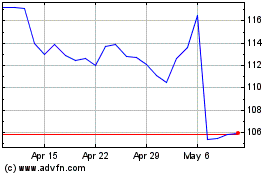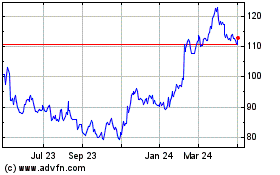Disney Ekes Out a Profit Under the Weight of Pandemic Problems -- Update
February 11 2021 - 7:20PM
Dow Jones News
By Erich Schwartzel and Allison Prang
Walt Disney Co. typically reports its first-quarter earnings
with news of a Christmas Day blockbuster performance at the box
office, or a holiday surge in theme-park attendance. On Thursday,
however, the company again demonstrated how Covid-19 has brutalized
its bottom line.
Still, its quarter beat pessimistic Wall Street estimates, and
Disney registered a profit of $17 million, or one cent a share. The
blow came from Disney's legacy businesses: Two-thirds of North
American movie theaters remain closed, and Disneyland is closed to
anyone who isn't showing up for a Covid-19 vaccine shot.
In the comparable period a year ago, before the Covid-19
pandemic started to affect the U.S., its profit was $2.11 billion,
or $1.16 a share.
Disney's first-quarter profit comes after the company reported
two quarterly losses in a row. But in a sign of how much has
changed at the world's largest entertainment company, Disney's
quarterly profit was about 2% of the domestic box-office gross of
the company's top-performing 2019 release, "Avengers: Endgame."
With the traditional movie business hurting, Bob Chapek,
approaching his first anniversary as Disney's chief executive
officer, reiterated the shift toward a streaming-first model.
"Our goal is to increasingly put the consumer in charge," said
Mr. Chapek.
The company's flagship streaming service, Disney+, added more
than 21 million new subscribers in the first quarter to hit 94.9
million subscribers as of Jan. 2, compared with 73.7 million
subscribers at the end of the fourth quarter. The service launched
in November 2019.
Disney remains a tale of two companies, and the quarterly
performance underscored its high-stakes pivot toward the
direct-to-consumer streaming business. Disney executives provided
some details of what a post-Covid-19 company might look like now
that vaccinations have begun and the reopening of theaters and
parks is on the horizon. The company maintains that "Black Widow,"
a Marvel superhero movie scheduled to premiere in May, will get a
theatrical release, and said mass vaccinations by April would be a
game-changer for its struggling parks division.
All told, the Disney division that includes its theme-park
business registered a $2.6 billion hit from Covid-19 in the
quarter, the company said. Even when the parks open, Mr. Chapek
said he expects social-distancing and mask-wearing to be required
at least through the end of the year.
The pandemic has forced some hard decisions that might have once
been considered heresy, said Mr. Chapek, citing a recent decision
to discontinue a popular annual pass program at Disneyland that
angered passionate fans. Other changes are on the way, he said.
"There's nothing like a pandemic to challenge the status quo,"
said Mr. Chapek.
Wall Street seems to have its eye on one figure: Disney+
subscribers. In December, Disney revised subscriber projections to
reach as many as 260 million by 2024, a benchmark that sent its
stock price soaring. Disney shares rose about 2% in after-hours
trading on Thursday.
Within Disney, the streaming service has become a crucial arm of
the company's franchise planning, since shows and movies that play
at home slot into the narratives of the feature films. Disney's new
Marvel Studios show, "WandaVision," for instance, includes clues to
the larger Marvel cinematic universe.
In recent months, a new Pixar Animation movie, "Soul," and the
second season of its breakout hit "The Mandalorian" have premiered
on the service. They both provided new-programming options that
boosted sign-ups.
The service has also allowed Disney to experiment with how it
releases movies. In March, its coming animated feature, "Raya and
the Last Dragon, " will be released on Disney+ as a premium-priced
rental option.
Disney said its adjusted earnings were 32 cents a share.
According to FactSet, Wall Street expected an adjusted loss of 34
cents a share.
Total revenue at Disney fell 22% to $16.25 billion, with revenue
dropping in both the company's media and entertainment distribution
and its parks, experiences and products segments. In the latter,
revenue plummeted by more than half. According to FactSet, analysts
were expecting total revenue of $15.9 billion.
Write to Erich Schwartzel at erich.schwartzel@wsj.com and
Allison Prang at allison.prang@wsj.com
(END) Dow Jones Newswires
February 11, 2021 19:05 ET (00:05 GMT)
Copyright (c) 2021 Dow Jones & Company, Inc.
Walt Disney (NYSE:DIS)
Historical Stock Chart
From Mar 2024 to Apr 2024

Walt Disney (NYSE:DIS)
Historical Stock Chart
From Apr 2023 to Apr 2024
